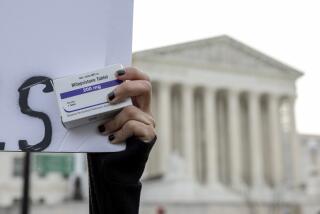Judge May Ban Silicone Injections
- Share via
LOS ANGELES — A federal judge said Monday that he was leaning toward barring a Newport Beach dermatologist from injecting liquid silicone into his patients’ faces. But the judge agreed to give the physician more time to support his contention that the treatment for acne scarring and wrinkles is exempt from governmental regulation.
U.S. District Judge William J. Rea gave Dr. James E. Fulton Jr. until May 11 to file additional arguments and the U.S. attorney’s office until May 18 to respond, according to lawyers for both sides.
The U.S. Food and Drug Administration contends that the injections are illegal because they have not been scientifically tested or approved.
A ruling on the FDA’s suit against Fulton is not expected until later this month at the earliest.
Fulton could not be reached for comment. But his attorney, Jay H. Geller, said the FDA has targeted his client and others because of the scare about leaking silicone breast implants. The FDA recently banned the implants for general use after public testimony from patients who said they suffered devastating health effects and disfigurement.
Unlike implants which contain significant amounts of silicone, Geller said liquid silicone treatment involves “microdroplets” injected in infinitesimal amounts over a period of time.
“It is our position that the scientific literature establishes that the procedure (of injecting liquid silicone in facial tissue) as well as the material itself is safe and effective when it is used properly,” Geller said.
But an FDA newsletter in August, 1991, reported problems with the injections, including “movement of the silicone to other parts of the body, inflammation, discoloration of surrounding tissues, and the formation of granulomas (nodules of granulated, inflamed tissue),” said Assistant U.S. Atty. Suzanne H. Segal.
Federal authorities filed a suit Feb. 28 against Fulton, codeveloper of Retin-A, a derivative of Vitamin A that has shown some effectiveness as a topical anti-wrinkle and anti-aging treatment. The suit also named the Acne Research Institute, a nonprofit research foundation, and Vivant Inc., both of Newport Beach.
The civil suit charges that Fulton continued to give patients liquid silicone injections to correct skin conditions, such as acne scars and wrinkles, despite warnings from the FDA and the chemical manufacturer, Dow Corning Corp.
On the day the suit was filed, FDA Commissioner David A. Kessler issued a public warning to consumers, saying injections of liquid silicone had never been scientifically evaluated for safety or efficacy.
In a letter in September, 1991, the FDA initially asked Fulton to voluntarily stop the facial injections, saying they were in violation of the 1976 Food, Drug and Cosmetic Act, Segal said.
Fulton responded by letter that his use of the chemical was not illegal. Geller said liquid silicone for injection purposes falls under the category of a “custom device” under the act and is exempt from FDA approval.
In Fulton’s own practice, he has seen only “a few minor adverse reactions in patients he has treated,” Geller said.
But in court documents, Segal cited a letter Fulton wrote to Dow Corning in June, 1990. Fulton asked Dow to analyze whether industrial-grade silicone he had purchased from the company was “contaminated.” He said some of the material had produced “granulomas” in some patients.
More to Read
Sign up for Essential California
The most important California stories and recommendations in your inbox every morning.
You may occasionally receive promotional content from the Los Angeles Times.










